RingCentral alternatives: The best business options for 2025

Project Specialist

Tags
Share
Whether you’re running a startup from your spare room or managing a large enterprise in need of a reliable phone system, effective communication with teammates, customers, and prospects is essential. Choosing the right solution is, therefore, a critical decision.
For many companies exploring VoIP (Voice over Internet Protocol) business phone systems, contact center software, or unified communications platforms, RingCentral is one name that pops up often.
If you’re still undecided and want to explore other alternatives, keep reading for a comprehensive comparison of how RingCentral measures up against eight of the top platforms available for businesses right now.
Webinar: Dialpad Support vs. RingCX
Learn how the new Dialpad Support for contact centers solution compares to RingCentral’s RingCX, and find out what happens when you turn on Ai for all contact center conversations.
What is RingCentral?
RingCentral is a legacy business communications provider that's been around since the days of PBX phone systems. It's slowly evolved its product offerings from landlines and hardware-focused systems to cloud-based communications software. Today, its solutions cover software for making VoIP calls, video conferencing, and business messaging.
Here’s how we decided on the best alternative to RingCentral
To put this list together, we considered the aspects that matter most to business owners and employees (based on real reviews from G2), and used this criteria to assess each solution:
Features
Aside from price, this is probably the first thing you’ll want to hear about. All the providers we researched offer a range of features, but in most cases, the level of phone services and functionality you get will depend on the pricing band you choose.
(Extra points for having business must-haves like auto-attendant, proprietary AI real-time sales support, text messaging, and voicemail included in the basic plan. Which Dialpad does have, by the way.)
Customer support
Let’s face it, some unified communications platforms are better at customer support than others. If your business operates internationally, you’ll probably need 24/5 or even 24/7 support globally—some providers only have US-based support or limited hours, so make sure to check the fine print here for the pricing tier you’re considering.
It's also not uncommon for companies with a heavy focus on enterprise customers to "tier" their customer support. (Which means that if your business represents only a few hundred or thousand dollars a month in revenue, or unless you're Bank of America or Delta Airlines, you might not get the best support possible.) So make sure you read the customer support reviews for all of these alternatives to RingCentral.
Cost-efficiency
We won’t tell you that pricing is an important consideration or “you get what you pay for” since that’s a given, but we will say that it’s best to consider the total cost of ownership, no matter which RingCentral alternative you’re looking at.
In other words, don’t just look at the initial price tag! Beyond the overall price per plan, we evaluated these options based on things like whether you have to pay extra for add-on features, per-minute calling rates locally and internationally, and setup or onboarding fees (which you might not hear about until you’re deep in the sales process).
Call quality
Whether it’s for professionalism or just being able to talk to your teammates on a daily basis, call quality is huge for businesses that are looking for a phone system. It’s no use getting a cheap business phone system that charges you a couple bucks a month if the call quality is so bad that you can’t get through a conversation properly—and there’s no faster way to ruin your NPS score or customer satisfaction.
Ease of use
These solutions are meant to make hybrid and remote work easier for your employees, not harder. And yes, they should pick up the slack for your IT team and be easy to administer. So, we took into consideration the time it takes to get up and running, the intuitiveness of the mobile and desktop apps, and how easy it is to do things like porting your number.
We also considered how scalable the platform is—a crucial but underrated factor for growing businesses.
Integration
Unified communications are all about, well, keeping your communication channels in one place and consolidating data as much as you can. One interesting thing about RingCentral is that even though it bills itself as an integrated UC (unified communications) + CC (contact center / call center) platform, it’s actually reselling another company’s contact center platform.2 (Specifically, NICE CXone—while these two companies comarket, they operate as two completely separate entities.) While RingCentral has recently introduced their own contact center, RingCX, many customers are still using the NICE platform.
Just something to consider, as this usually means different account logins and user interfaces or experiences between your contact center and unified communications platform.
What makes it a great RingCentral alternative?
And finally, as well as the overall functionality of each solution, we’ll also look at how it compares directly with RingCentral.
The 8 best RingCentral alternatives for small businesses and enterprises
1. Dialpad Connect: A truly unified platform with powerful AI technology
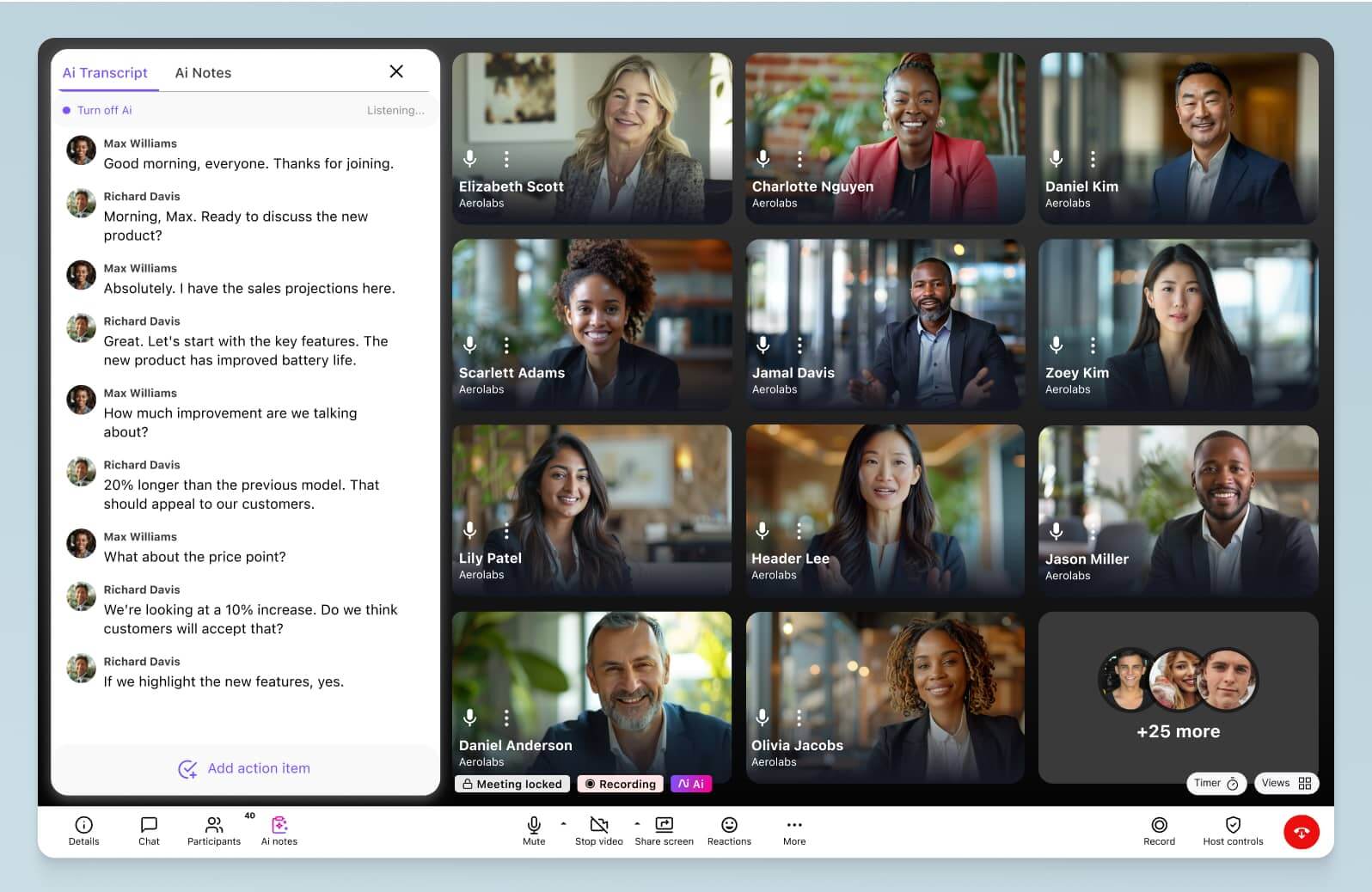
Dialpad is a cloud-based unified communications system, promising unbeatable reliability (100% uptime for enterprise customers) thanks to worldwide data centers and 24/7 global support.
Because it’s built on the Google Cloud Platform, Dialpad offers excellent security and reliability, and also excellent call quality. Not only does Dialpad give you video meetings, messaging, and phone calls all in one app…
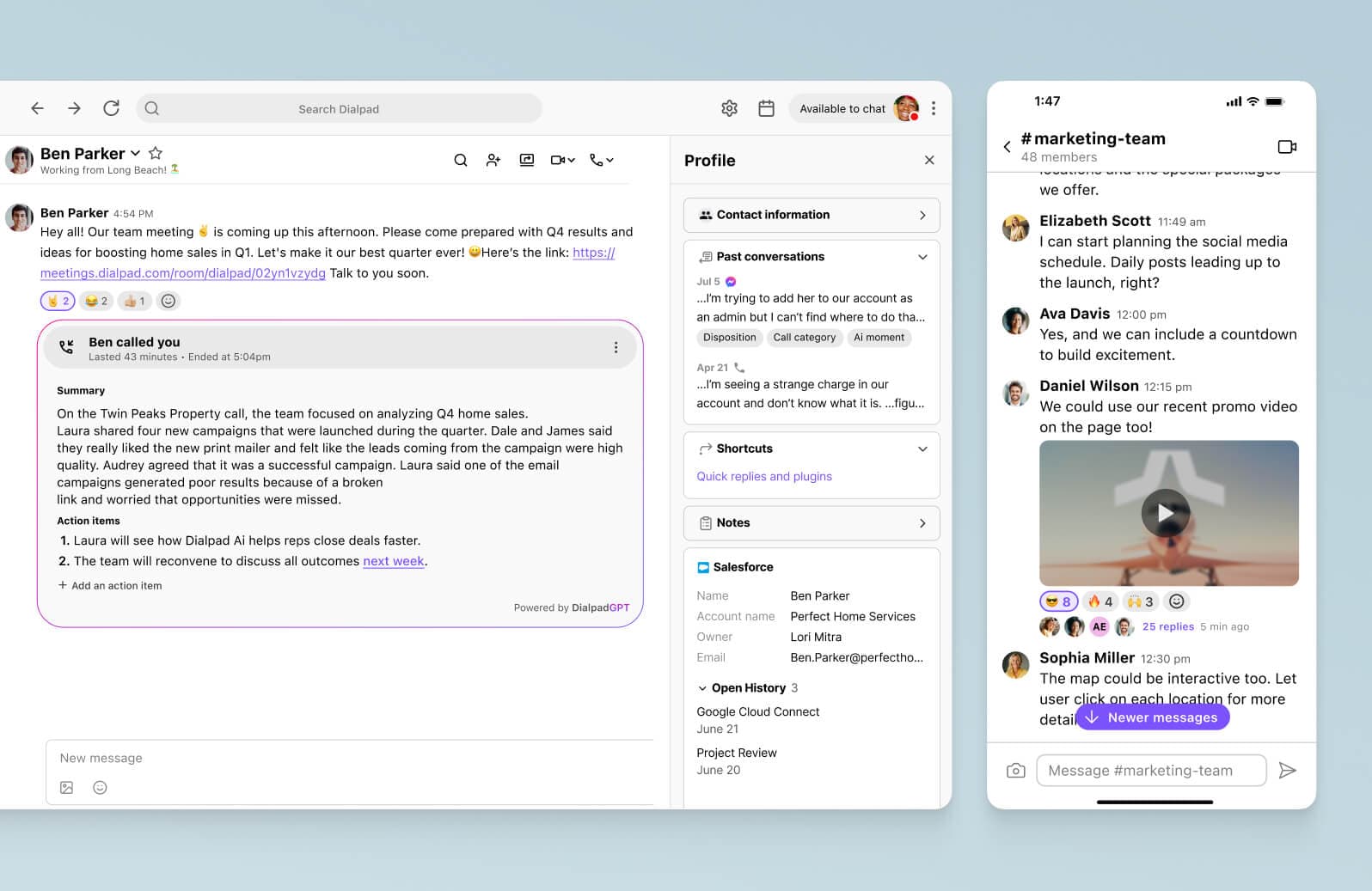
It also has a fully integrated cloud contact center platform that—uniquely among all of these RingCentral alternatives—has the same aesthetic and user experience as the UC side. It's built and maintained by our own in-house team, and you can use your web browser without needing to download anything, which also goes for contact center agents, who can work from anywhere just like your average office worker.
Dialpad also has built-in analytics to make life easier for managers and supervisors. For example, there are heat maps that show call volume and average speed of answer:
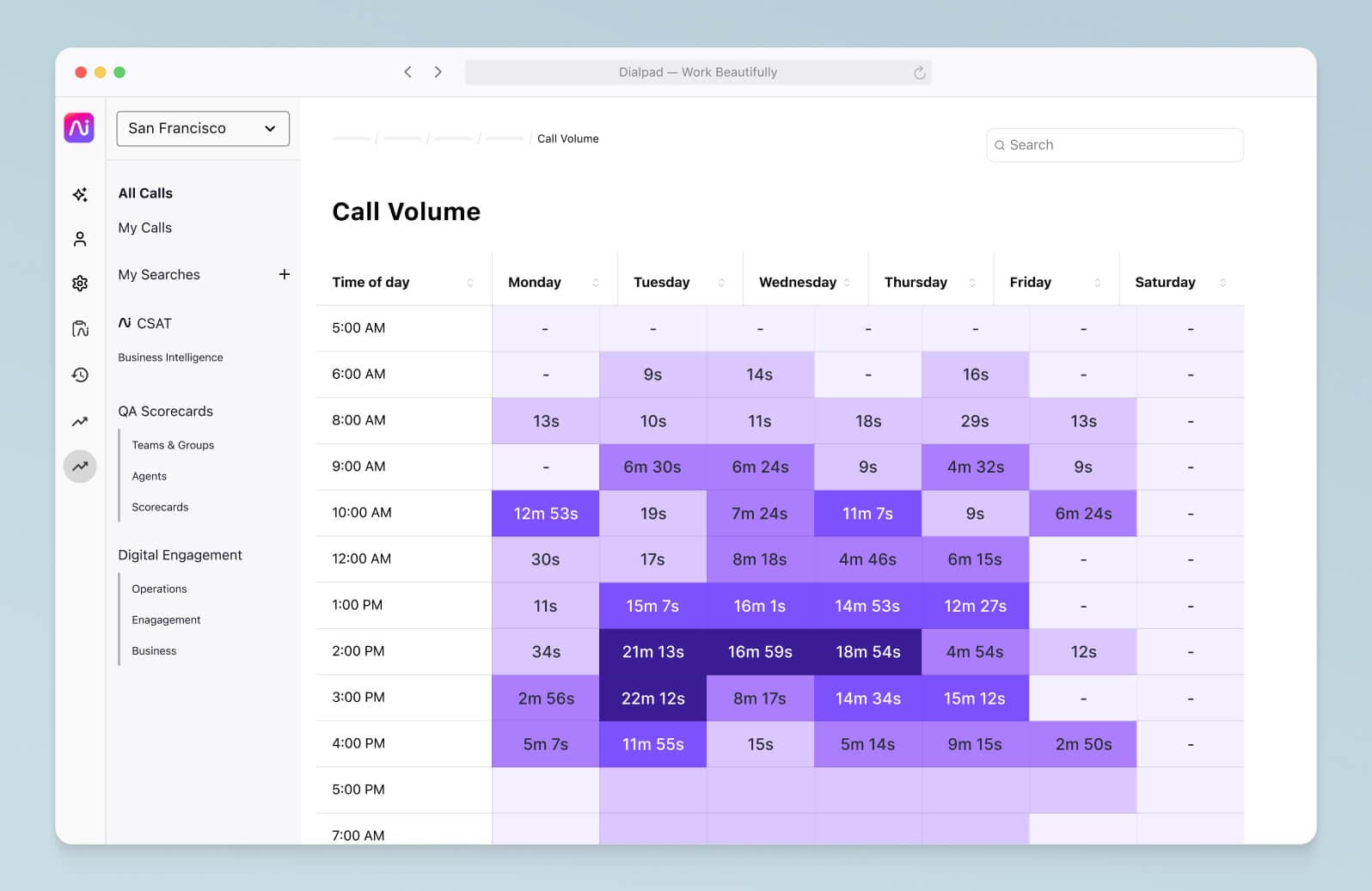
But the biggest differentiator for businesses is Dialpad’s industry-leading artificial intelligence technology, Dialpad Ai.
Trained on over four billion minutes of proprietary voice and messaging data, Dialpad Ai is purpose-built for business conversations. And not only can it transcribe your voice and video calls in real time, Dialpad Ai also integrates with ChatGPT to automatically generate a call summary with a short recap in friendly, natural language after every meeting:
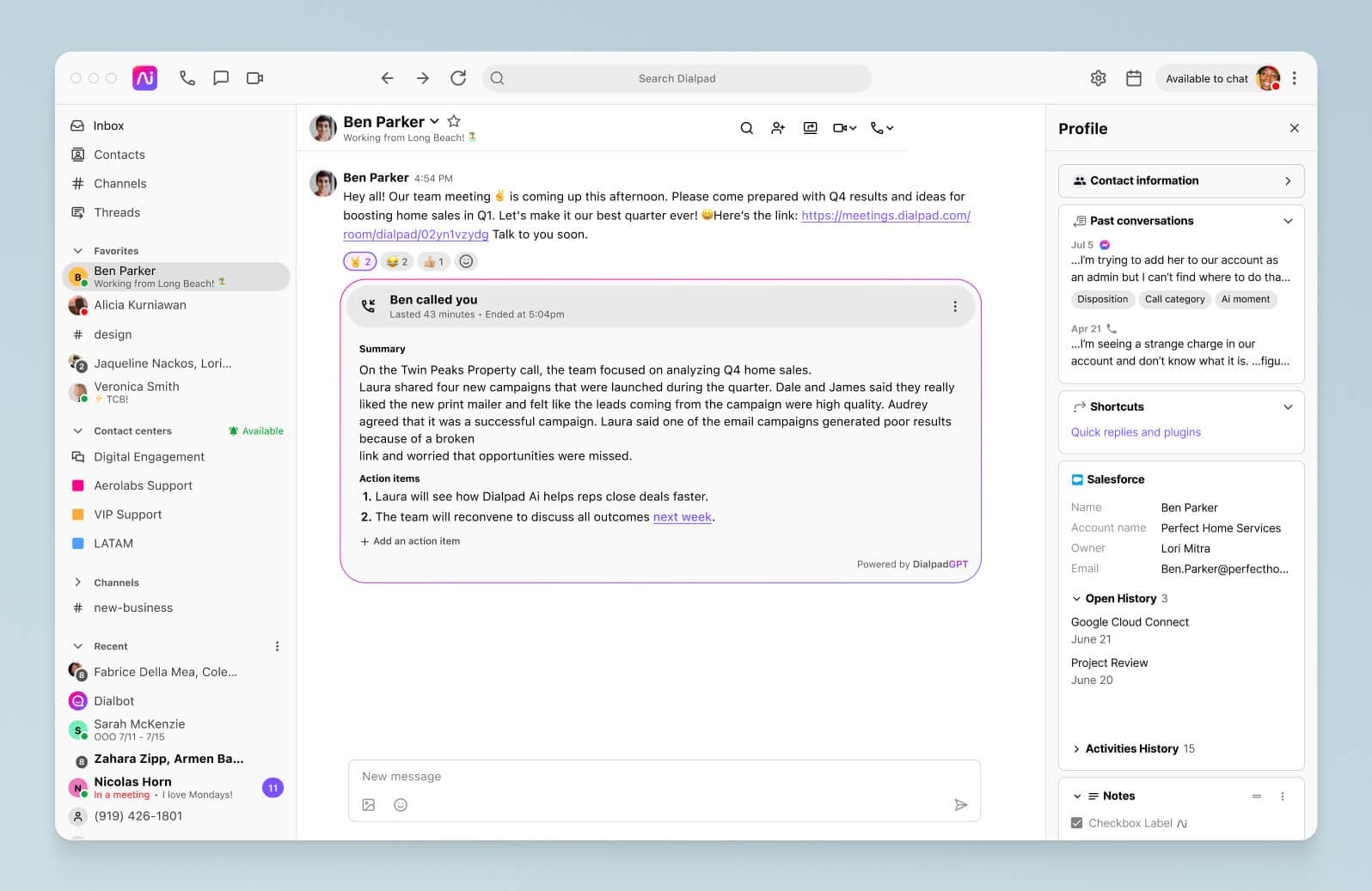
It can also recognize and track keywords and phrases—which, for example, means that Sales and Support teams can track how frequently competitor names and features or issues come up on calls with customers and prospects:
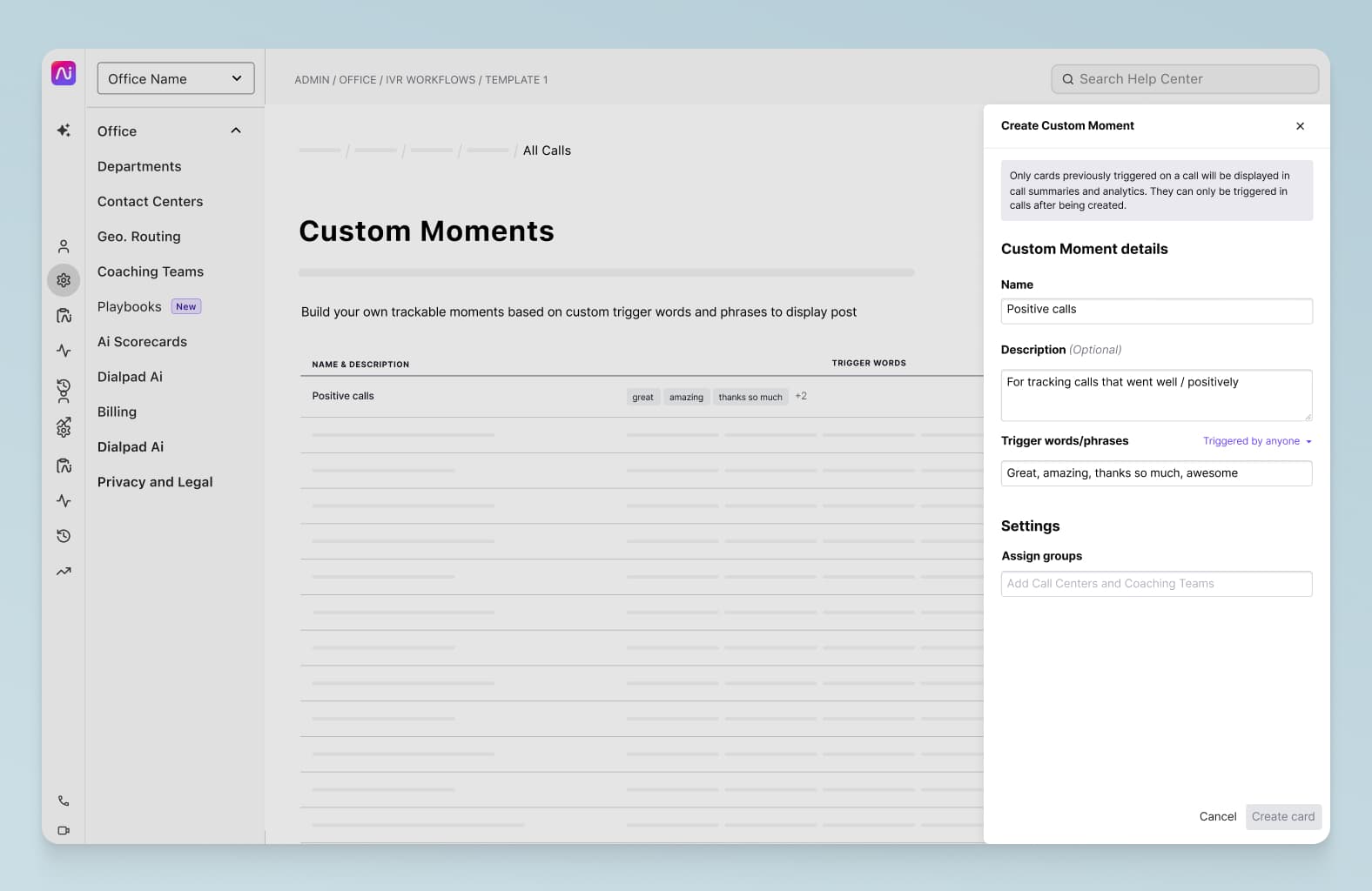
But that’s not all. To take this one step further, Dialpad can also trigger Real-time Assist (RTA) cards automatically when keywords or phrases are spoken on calls. These are essentially customizable cheat sheets that can help agents and reps with tricky topics as they’re talking to customers. For example, if your Sales team gets lots of questions about pricing, you can create an RTA card with pricing notes and set it to pop up when “price” or “pricing” is said on a call:
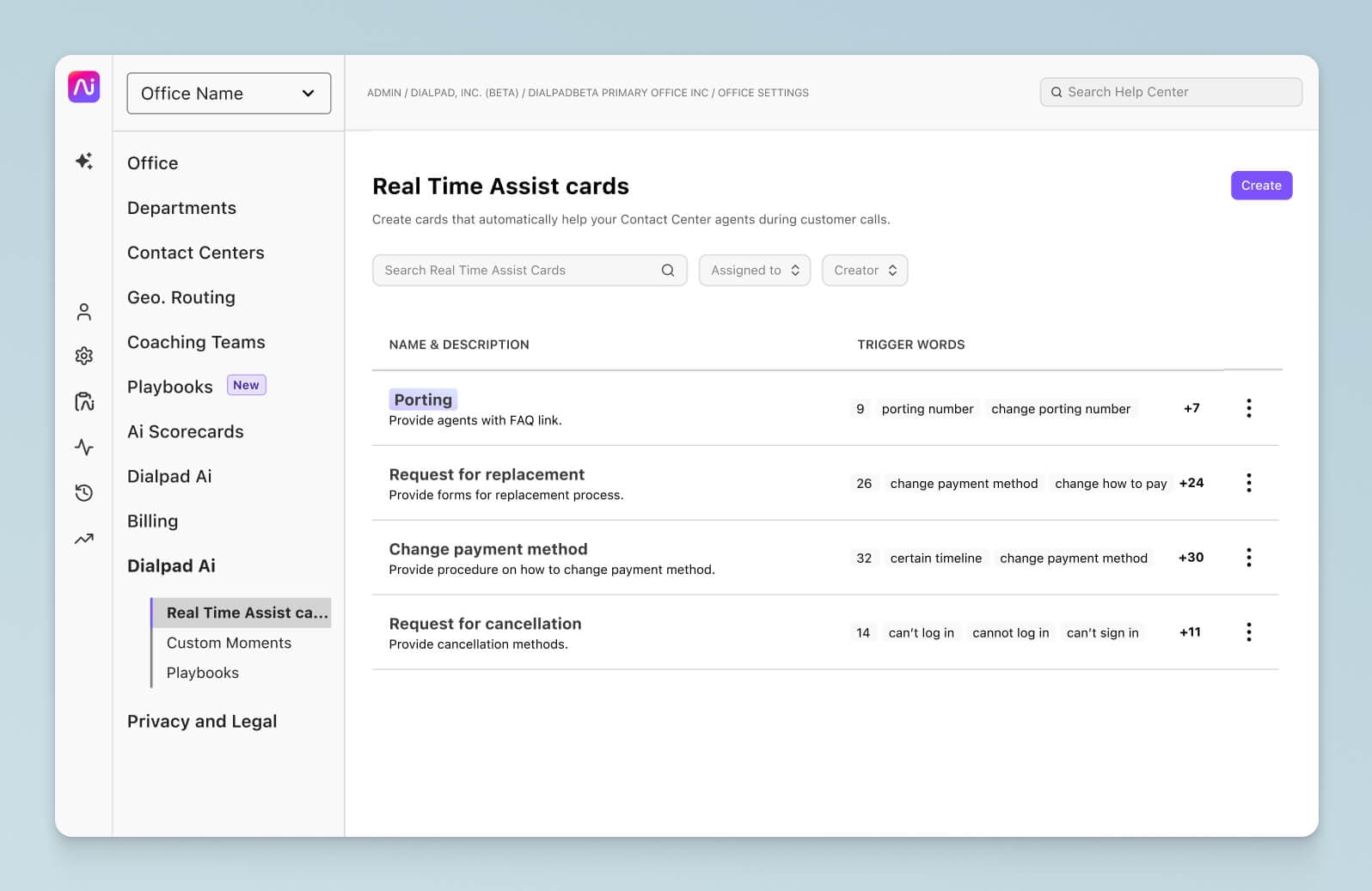
What makes Dialpad the best of all RingCentral alternatives?
RingCentral, like many long-established business phone services, has been around for decades. Whether or not their telephony architecture has been updated, or how much it's been updated, in recent years is not clear—what we do know is that Dialpad is built on a unique dual-cloud architecture that is both modern and extremely flexible.
Not only that, both Dialpad’s unified communications and contact center platforms are built and supported in-house (not the case for RingCentral’s contact center solution, which is white-labeled or sold on behalf of another company). Again, RingCentral has recently introduced their own contact center, RingCX, but many customers are still using the NICE platform.
Generally, it also takes longer to set up a new user on RingCentral (more, if you’re starting a contact center)—we encourage you to try the free trial and see for yourself what the process is like. With Dialpad, you can add new users easily yourself and set up phone numbers for them in seconds:
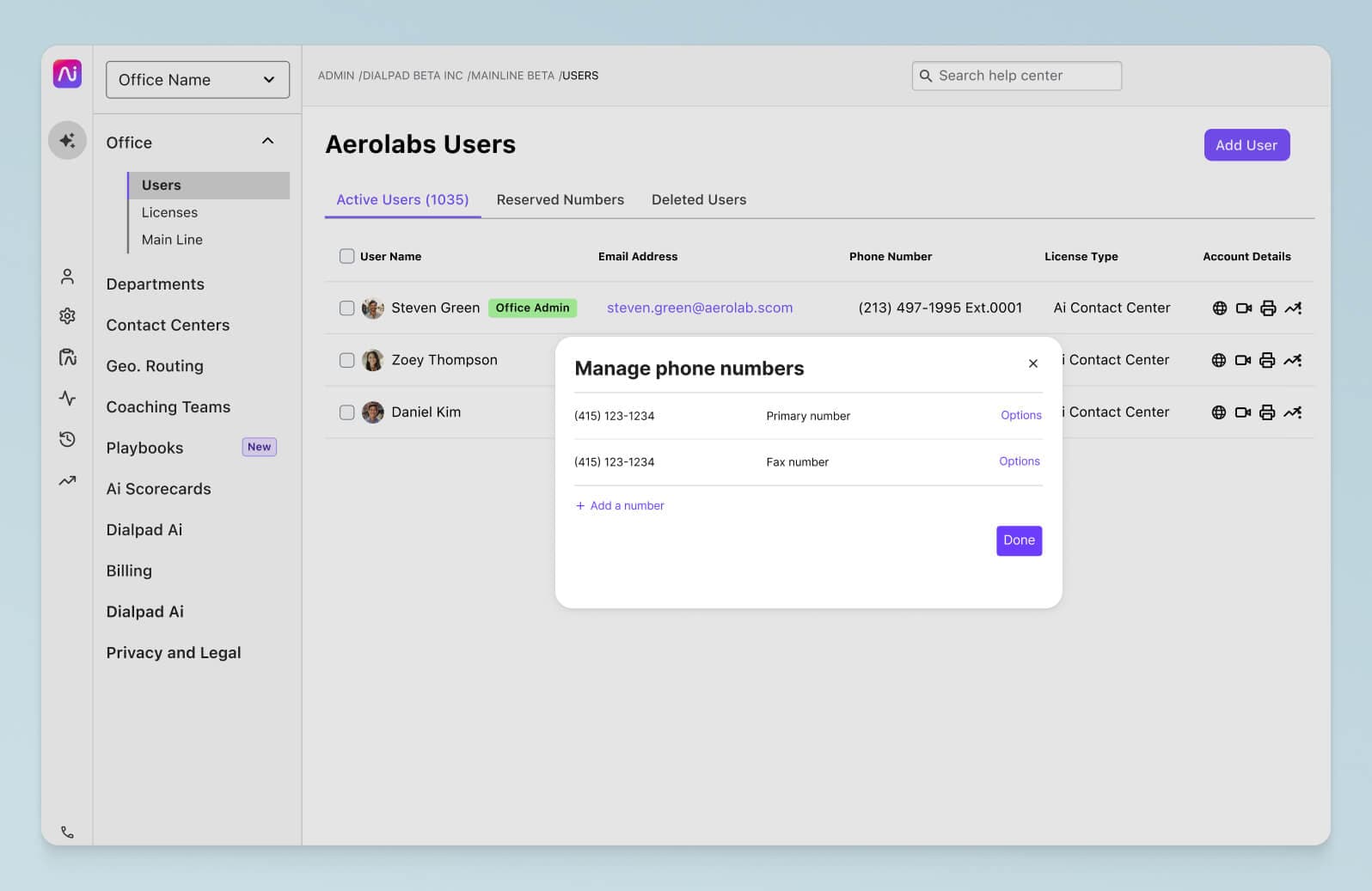
RingCentral does have more integrations, but Dialpad’s app marketplace is growing every day, and its open API makes it possible for you to build custom integrations with whatever tools your team is using. (Plus, Dialpad integrations are available to all users, not just contact center agents.)
As of right now, Dialpad has integrations with popular software like Salesforce, Microsoft Teams, and more.
📚 Further reading:
Get the G2 Report that breaks down user ratings comparing Dialpad Connect against RingCentral's UCaaS platform, and also Dialpad Support vs RingCentral Contact Center.
Dialpad Connect pricing
Standard: $15 per user per month; Includes SMS and MMS, unlimited calling, call controls, voicemail transcription, Google Workspace and Microsoft 365 integrations, custom off-hours routing, multi-level auto attendant, a free local VoIP number, toll-free number support, and more
Pro: $25 per user per month; Includes Everything in the Standard plan plus hold queues, a wider range of integrations including Salesforce and Outreach, 24/7 phone and chat support, and more
Enterprise: Everything in Pro plus service level agreements and custom retention policies
Try the best of all RingCentral alternatives
Sign up for a 14-day free trial to take it for a spin! It takes just a few minutes (even faster if you sign up with your Gmail or Microsoft 365 account) to get set up with a business phone number. Or, take a self-guided interactive tour of the app first!
2. Grasshopper: Designed for (super) small businesses
This virtual phone system is another well-known RingCentral alternative, although it’s aimed specifically at smaller businesses that are looking for affordability over functionality.
Grasshopper does require an existing line to forward calls from, and you can download the mobile app to use it on the go. It has call forwarding and Wi-Fi calling on every plan, but lacks the “unified communications” piece—there’s no video conferencing or instant messaging, and if you need a small business call center solution, it doesn’t have those features either. Learn more about the best Grasshopper alternatives.
What makes it one of the better RingCentral alternatives?
Grasshopper markets itself as being for small businesses specifically, so price-wise, it may be more affordable than RingCentral. In terms of ease of use, we’d probably recommend trying out the free trial and comparing it with RingCentral’s user experience. If your business is very small or doesn’t have many communications needs, you might find that Grasshopper gives you enough functionality without needing to go with RingCentral since it has the basics like a desktop and mobile app and voicemail included in all plans.
Another winner is that you can have two phone numbers on a single phone, so customers can reach your mobile without needing your personal number. Inbound and outbound faxes also go from the same business number.
Pricing
Grasshopper plans start at $14 per month.3
3. Nextiva: An established name in the communications space
Another relatively well-known provider, Nextiva offers a VoIP phone system that includes video conferencing and messaging like Dialpad.
The Essential plan includes integrations with Microsoft Outlook and Google Contacts accounts, while the next tier brings in integrations with tools like Salesforce, HubSpot, Zendesk, and Microsoft Teams—similar to RingCentral.
Also like RingCentral, Nextiva is reselling another company’s software as their own, except it’s reselling both its UCaaS4 and CCaaS5 products. Again, this can make things like integrations and getting customer support especially tricky since you may have to go through a third party—for both platforms—so keep that in mind.
What makes it a good RingCentral alternative?
Nextiva is quite close to RingCentral in terms of the features you get on both the basic and premium tiers, from calling to business SMS messaging. This one is pretty close to call between the two, and for us it comes down to personal preference—the user interfaces are a bit different, and the functionality might vary a little, but there aren’t too many major differences beyond that and maybe pricing. (Learn more about the best Nextiva alternatives.)
Pricing
Nextiva plans start at $20 per user per month for digital channels only, and $30 per user per month for plans that include inbound/outbound voice.6
4. Ooma Office: For desktop-based users
Ooma Office keeps things simple with just two pricing plans, both affordable for small businesses and with the ability to get up and running in a very short time.
The packages are available without a contract, and the lower tier has most of the basic features you'd need in a business phone system, including HD voice, hold music, and call blocking, while call transfer happens seamlessly between devices. You’ll also get ring groups, a conference bridge for meetings with up to 10 participants, and an auto-attendant with custom messages and rules.
Upgrading to Pro adds call recording and voicemail transcription. (Neither plan has team messaging, which is where you’d be better off with Dialpad.)
What makes it a good alternative to RingCentral?
The price is probably lower, which small businesses will like. If you’re looking for a cheap, basic business phone system with simple pricing, Ooma Office could be a good RingCentral MVP alternative.
Pricing
Ooma Office plans start at $19.99 per user per month.7
🤿 Deep dive:
Get a closer look at Dialpad vs Ooma Office here.
5. Vonage Unified Communications: Good call quality and flexible routing
Vonage is a cloud-based VoIP service with a mobile and desktop app. Out of all these RingCentral alternatives, Vonage is probably the most “a-la-carte” focused, meaning the plans themselves come with very little functionality included in comparison, and everything can be added for a fee.
It doesn’t have its own built-in video conferencing software, but uses a third party, Amazon Chime Pro Tier, instead. It does have team messaging, where everyone with the app can start or join group chats, share files, and participate in video and voice calls.
What makes it a good alternative to RingCentral?
If you’re looking for flexibility, then RingCentral’s plans aren’t quite as customizable as Vonage’s a-la-carte scheme—without the ability to pick and choose, you may end up paying for features you don’t even need.
When it comes to toll-free numbers, RingCentral does have more—but the downside is that it doesn’t test them as extensively as Vonage (so we’ll call that a draw). Vonage wins out on customer IT support—though it costs extra—with the Vonage Support PLUS add-on to help with hardware installation, virus removal, and third-party integrations.
Pricing
Vonage plans start at $13.99 per user per month.8
6. GoTo Connect: A custom pricing option
For small teams and freelancers who need straightforward and affordable cloud communications, GoTo Connect offers simple setup and pricing, plus enough features to get you up and running.
Formerly known as Jive, it’s now part of LogMeIn, which now houses all the GoTo products. GoTo Connect combines Jive’s original cloud phone system with GoTo Meeting’s video and audio conferencing solution for a unified package. Learn more about the best GoTo Meeting alternatives.
Tools include auto attendant, mobile apps, call forwarding, virtual voicemail, and ring groups—and they’re all simple to set up and make changes to.
What makes it a good alternative to RingCentral?
GoTo Connect rates well online for customer service, with phone support, email, and tickets, plus customer support content like data sheets, user guides, FAQs, and videos. It even has a helpful community for crowdsourcing answers to questions.
The pricing scheme is also attractive in comparison to what you might get charged at RingCentral.
Pricing
GoToConnect plans start at $26 per month.9
7. Mitel MiCloud Connect
Mitel has been in business for over 40 years (not bad for a company that swapped selling lawn mowers for telephony!) and is recognized as a tried-and-tested brand. Like Dialpad, it’s built on Google Cloud.
It offers a combination of on-premises and cloud-based PBX hosting, and includes the standard comms functions of phone, text, and video calling. You’ll also find tools like customer ID, automatic speech recognition, and call routing—plus a dashboard with real-time performance updates.
They don’t openly advertise prices, so you need to get in touch for a quote or demo.
What makes it a good RingCentral alternative?
Mitel scores highly on ease of use and compared to RingCentral, it’s generally easier to set up the system and perform ongoing maintenance. Users can access Jump Start and Expert Start options, VoIP phones with a built-in help button, and on-demand support and training.
With no set plans available, Mitel also allows you to build your own system and pay only for the features you want—this makes it a scalable solution for smaller businesses.
The platform works across devices including Android and iOS.
Pricing:
There aren't any numbers available on their pricing page.10
📚 Further reading:
Learn more about the best Mitel alternatives that won't break the bank.
8. Intermedia: Stable software uptime
Intermedia’s big sell is that it promises 99.999% uptime (did we mention Dialpad promises 100% for enterprise customers?), with a financially-backed service level agreement.
Like Ooma, it simplifies things by having just two pricing plans, and both have a range of features including voicemail transcription, auto-attendant, caller ID, and customizable hold music.
What makes it a good RingCentral alternative?
The pricing plans are simple to understand, and the cheaper one—Unite Pro—allows for 100 participants in video conferences and 200 in audio. That’s way ahead of RingCentral, although it’s worth noting that the cheaper option is almost twice as expensive as Dialpad’s least expensive plan. Pro also includes pretty much all of RingCentral’s features (apart from real-time supervisor functions like whisper and barge).
Intermedia also offers 24/7 customer support, but they don’t say online whether it’s US-only or worldwide.
Intermedia doesn’t make you sign up for annual contracts, which is a bonus for smaller businesses. And you get unlimited calls in the US, Canada, and Puerto Rico, alongside international calling.
Pricing
Intermedia Unite plans start at $27.99 per user per month.11
Which is the best option out of all RingCentral competitors?
Choosing a VoIP provider for business communications can be challenging due to the crowded market and the difficulty of understanding a solution’s specifics before using it. If you’re considering a particular service provider after reading this post, we recommend taking advantage of a free trial. For instance, Dialpad offers a 14-day free trial, and you can sign up quickly and easily using your Google or Microsoft 365 account.
Many competitors to RingCentral provide similar phone systems, so it’s important to carefully examine the feature lists to find the best value. Compare not just the prices but also the features included in each plan. For example, RingCentral's least expensive Core plan may lack some features available in Dialpad’s least expensive Standard tier.
While we might be a bit partial, if your business needs a cloud-based communications solution with robust, modern functionality at an affordable price, consider giving Dialpad a test drive.
Check out the best RingCentral alternative
Looking for RingCentral competitors that could give your business a more flexible, agile, and affordable way to communicate with customers, prospects, and teammates? Sign up for Dialpad's free 14-day free trial. Or, take a self-guided interactive tour of the app!
1ringcentral.com/office/plansandpricing_a.html#office
2channelfutures.com/telephony-uc-collaboration/ringcentral-nice-extend-partnership-to-offer-ringcentral-contact-center
3signup.grasshopper.com/plans
4talkingpointz.com/nextiva-competing-around-the-customer-experience/
5businesswire.com/news/home/20210609005705/en/Nextiva-and-Five9-Team-Up-to-Help-Businesses-Deliver-Seamless-Customer-Communications
6nextiva.com/nextiva-pricing.html
7support.ooma.com/office/ooma-office-pricing-chart/
8vonage.com/unified-communications/pricing/
9goto.com/pricing/connect
10mitel.com/voip/pricing
11intermedia.com/products/unite/pricing








